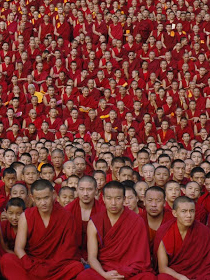- Home
- FPMT Homepage
Foundation for the Preservation of the Mahayana Tradition
The FPMT is an organization devoted to preserving and spreading Mahayana Buddhism worldwide by creating opportunities to listen, reflect, meditate, practice and actualize the unmistaken teachings of the Buddha and based on that experience spreading the Dharma to sentient beings. We provide integrated education through which people’s minds and hearts can be transformed into their highest potential for the benefit of others, inspired by an attitude of universal responsibility and service. We are committed to creating harmonious environments and helping all beings develop their full potential of infinite wisdom and compassion. Our organization is based on the Buddhist tradition of Lama Tsongkhapa of Tibet as taught to us by our founders Lama Thubten Yeshe and Lama Thubten Zopa Rinpoche.
- Willkommen
Die Stiftung zur Erhaltung der Mahayana Tradition (FPMT) ist eine Organisation, die sich weltweit für die Erhaltung und Verbreitung des Mahayana-Buddhismus einsetzt, indem sie Möglichkeiten schafft, den makellosen Lehren des Buddha zuzuhören, über sie zur reflektieren und zu meditieren und auf der Grundlage dieser Erfahrung das Dharma unter den Lebewesen zu verbreiten.
Wir bieten integrierte Schulungswege an, durch denen der Geist und das Herz der Menschen in ihr höchstes Potential verwandelt werden zum Wohl der anderen – inspiriert durch eine Haltung der universellen Verantwortung und dem Wunsch zu dienen. Wir haben uns verpflichtet, harmonische Umgebungen zu schaffen und allen Wesen zu helfen, ihr volles Potenzial unendlicher Weisheit und grenzenlosen Mitgefühls zu verwirklichen.
Unsere Organisation basiert auf der buddhistischen Tradition von Lama Tsongkhapa von Tibet, so wie sie uns von unseren Gründern Lama Thubten Yeshe und Lama Thubten Zopa Rinpoche gelehrt wird.
- Bienvenidos
La Fundación para la preservación de la tradición Mahayana (FPMT) es una organización que se dedica a preservar y difundir el budismo Mahayana en todo el mundo, creando oportunidades para escuchar, reflexionar, meditar, practicar y actualizar las enseñanzas inconfundibles de Buda y en base a esa experiencia difundir el Dharma a los seres.
Proporcionamos una educación integrada a través de la cual las mentes y los corazones de las personas se pueden transformar en su mayor potencial para el beneficio de los demás, inspirados por una actitud de responsabilidad y servicio universales. Estamos comprometidos a crear ambientes armoniosos y ayudar a todos los seres a desarrollar todo su potencial de infinita sabiduría y compasión.
Nuestra organización se basa en la tradición budista de Lama Tsongkhapa del Tíbet como nos lo enseñaron nuestros fundadores Lama Thubten Yeshe y Lama Zopa Rinpoche.
A continuación puede ver una lista de los centros y sus páginas web en su lengua preferida.
- Bienvenue
L’organisation de la FPMT a pour vocation la préservation et la diffusion du bouddhisme du mahayana dans le monde entier. Elle offre l’opportunité d’écouter, de réfléchir, de méditer, de pratiquer et de réaliser les enseignements excellents du Bouddha, pour ensuite transmettre le Dharma à tous les êtres. Nous proposons une formation intégrée grâce à laquelle le cœur et l’esprit de chacun peuvent accomplir leur potentiel le plus élevé pour le bien d’autrui, inspirés par le sens du service et une responsabilité universelle. Nous nous engageons à créer un environnement harmonieux et à aider tous les êtres à épanouir leur potentiel illimité de compassion et de sagesse. Notre organisation s’appuie sur la tradition guéloukpa de Lama Tsongkhapa du Tibet, telle qu’elle a été enseignée par nos fondateurs Lama Thoubtèn Yéshé et Lama Zopa Rinpoché.
Visitez le site de notre Editions Mahayana pour les traductions, conseils et nouvelles du Bureau international en français.
Voici une liste de centres et de leurs sites dans votre langue préférée
- Benvenuto
L’FPMT è un organizzazione il cui scopo è preservare e diffondere il Buddhismo Mahayana nel mondo, creando occasioni di ascolto, riflessione, meditazione e pratica dei perfetti insegnamenti del Buddha, al fine di attualizzare e diffondere il Dharma fra tutti gli esseri senzienti.
Offriamo un’educazione integrata, che può trasformare la mente e i cuori delle persone nel loro massimo potenziale, per il beneficio di tutti gli esseri, ispirati da un’attitudine di responsabilità universale e di servizio.
Il nostro obiettivo è quello di creare contesti armoniosi e aiutare tutti gli esseri a sviluppare in modo completo le proprie potenzialità di infinita saggezza e compassione.
La nostra organizzazione si basa sulla tradizione buddhista di Lama Tsongkhapa del Tibet, così come ci è stata insegnata dai nostri fondatori Lama Thubten Yeshe e Lama Zopa Rinpoche.
Di seguito potete trovare un elenco dei centri e dei loro siti nella lingua da voi prescelta.
- 欢迎 / 歡迎
简体中文
“护持大乘法脉基金会”( 英文简称:FPMT。全名:Foundation for the Preservation of the Mahayana Tradition) 是一个致力于护持和弘扬大乘佛法的国际佛教组织。我们提供听闻,思维,禅修,修行和实证佛陀无误教法的机会,以便让一切众生都能够享受佛法的指引和滋润。
我们全力创造和谐融洽的环境, 为人们提供解行并重的完整佛法教育,以便启发内在的环宇悲心及责任心,并开发内心所蕴藏的巨大潜能 — 无限的智慧与悲心 — 以便利益和服务一切有情。
FPMT的创办人是图腾耶喜喇嘛和喇嘛梭巴仁波切。我们所修习的是由两位上师所教导的,西藏喀巴大师的佛法传承。
繁體中文
護持大乘法脈基金會”( 英文簡稱:FPMT。全名:Found
ation for the Preservation of the Mahayana Tradition ) 是一個致力於護持和弘揚大乘佛法的國際佛教組織。我們提供聽聞, 思維,禪修,修行和實證佛陀無誤教法的機會,以便讓一切眾生都能 夠享受佛法的指引和滋潤。 我們全力創造和諧融洽的環境,
為人們提供解行並重的完整佛法教育,以便啟發內在的環宇悲心及責 任心,並開發內心所蘊藏的巨大潛能 — 無限的智慧與悲心 – – 以便利益和服務一切有情。 FPMT的創辦人是圖騰耶喜喇嘛和喇嘛梭巴仁波切。
我們所修習的是由兩位上師所教導的,西藏喀巴大師的佛法傳承。 察看道场信息:
- FPMT Homepage
- News/Media
-
- Study & Practice
-
-
- About FPMT Education Services
- Latest News
- Programs
- New to Buddhism?
- Buddhist Mind Science: Activating Your Potential
- Heart Advice for Death and Dying
- Discovering Buddhism
- Living in the Path
- Exploring Buddhism
- FPMT Basic Program
- FPMT Masters Program
- FPMT In-Depth Meditation Training
- Maitripa College
- Lotsawa Rinchen Zangpo Translator Program
- Universal Education for Compassion & Wisdom
- Online Learning Center
-
- Prayers & Practice Materials
- Overview of Prayers & Practices
- Full Catalogue of Prayers & Practice Materials
- Explore Popular Topics
- Benefiting Animals
- Chenrezig Resources
- Death & Dying Resources
- Lama Chopa (Guru Puja)
- Lama Zopa Rinpoche: Compendium of Precious Instructions
- Lama Zopa Rinpoche: Life Practice Advice
- Lama Zopa Rinpoche Practice Series
- Lamrim Resources
- Mantras
- Prayer Book Updates
- Purification Practices
- Sutras
- Thought Transformation (Lojong)
- Audio Materials
- Dharma Dates - Tibetan Calendar
- Translation Services
- Publishing Services
- Ways to Offer Support
- Prayers & Practice Materials
-
- Teachings and Advice
- Find Teachings and Advice
- Lama Zopa Rinpoche Advice Page
- Lama Zopa Rinpoche: Compendium of Precious Instructions
- Lama Zopa Rinpoche Video Teachings
- ༧སྐྱབས་རྗེ་བཟོད་པ་རིན་པོ་ཆེ་མཆོག་ནས་སྩལ་བའི་བཀའ་སློབ་བརྙན་འཕྲིན།
- Podcasts
- Lama Yeshe Wisdom Archive
- Buddhism FAQ
- Dharma for Young People
- Resources on Holy Objects
- Teachings and Advice
-
-
*If a menu item has a submenu clicking once will expand the menu clicking twice will open the page.
-
-
- Centers
-
- Teachers
-
- Projects
-
-
-
-
*If a menu item has a submenu clicking once will expand the menu clicking twice will open the page.
-
-
- FPMT
-
-
-
-
-
One must practice with the bodhisattva attitude every day. People can’t see your mind, what people see is a manifestation of your attitude in your actions of body and speech. Pay attention to your attitude all the time, guard it as if you are the police, or like a maid cares for a child, like a bodyguard, or like you are the guru and your mind is your disciple.
Lama Zopa Rinpoche
-
-
-
- Shop
-
-
-
The Foundation Store is FPMT’s online shop and features a vast selection of Buddhist study and practice materials written or recommended by our lineage gurus. These items include homestudy programs, prayers and practices in PDF or eBook format, materials for children, and other resources to support practitioners.
Items displayed in the shop are made available for Dharma practice and educational purposes, and never for the purpose of profiting from their sale. Please read FPMT Foundation Store Policy Regarding Dharma Items for more information.
-
-
Advice from Spiritual Friends
8
Many Buddhist practitioners have encountered feelings of loneliness. According to Lama Zopa Rinpoche’s Online Advice Book, Rinpoche once heard a monk comment that he felt people didn’t want to be with him and were avoiding him. Rinpoche offered this advice:
That is no problem at all. It is good, because you waste so much of your time if people are interested in meeting you. Then, no meditation, no study, nothing, just blah, blah, blah, blah. That is why Milarepa achieved enlightenment in a brief lifetime during degenerate times. Why did he go to meditate in very high mountains? That is the whole point. He did it in order not to waste his life. … Buddha said that as long as one follows desire, one will never get satisfaction. Satisfaction, here, means peace of mind, but in a broader way it also means to understand that as long as one follows desire, there is no liberation and no enlightenment.
You can read the complete advice Rinpoche offered this monk at “Lama Zopa Rinpoche’s Online Advice Book” on the Lama Yeshe Wisdom Archive website.

Lama Zopa Rinpoche. Photo by Ven. Roger Kunsang.
After the terrorist attacks in the United States in September 2001 and the beginning of war in the Middle East, Lama Zopa Rinpoche wrote an open letter to former U.S. President George W. Bush about the effectiveness of spiritual solutions for the crisis the world was facing.
“War is what ordinary people in the world regard as the solution,” Lama Zopa Rinpoche wrote. “The problem is that war, even if it is won, is like a medicine that has side effects. It may temporarily help the situation but afterwards there will be continual complications. Why? Because the people you defeat generate hatred towards you and in future generations they harm you back. In the natural law of actions, called karma in Sanskrit, the action of harming leaves an imprint on the mental continuum and that imprint is like a seed. When it ripens later, the person experiences the result of receiving harm from others.”
From Mandala March-May 2002.

Photo by Jeff Gould
In Ultimate Healing, published by Wisdom Publications, Lama Zopa Rinpoche, spiritual director of the Foundation for the Preservation of the Mahayana Tradition (FPMT) suggests the cure for not only depression, but all forms of illness and disease: unqualified love in the form of compassion for all living beings – including oneself. Written with humility and kindness, Ultimate Healing is rich in wisdom and practical help for those in pain.
“Depression can be the result of a specific situation, in which case you can apply the relevant meditation to deal with those conditions; however, depression and feelings of hopelessness can also arise for no particular reason. When you are experiencing depression, you should prepare yourself each morning by making a strong determination not to allow the situation to upset you. [This] strengthens you and gives you courage. Also make a strong determination to transform your depression into happiness. During the day, when you start to feel depressed or upset, you should immediately remember the determination you made in the morning and not let the situation overwhelm you. No matter how bad the situation seems, and even if it is commonly regarded as a serious problem, you should not allow it to make your life dark and depressed.
“After making this determination, you then mentally prepare yourself for the day by thinking of the methods you will use when you start to feel depressed or upset. There are various special techniques for fighting depression …”
From Mandala March-May 2002
- Tagged: depression, lama zopa rinpoche, mandala, teachings and advice
- 0
31
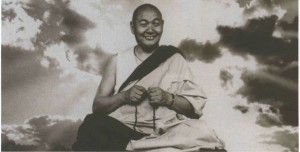
Photo by Robin Bath
Lama Yeshe’s talk in Berkeley, California, in the summer of 1983 was given at a time when the world was in a state of anxiety about the threat of nuclear war. How easily it translates to today when new fears have arisen. As Lama said, “First we create a situation; then we’re scared of it. … However, there’s no need for fear, worry or anxiety because, first of all, nuclear energy is a reality and secondly, our opinion of what’s happening is just that – an opinion. It’s not yet a reality; it’s simply a presumption.” This extract, edited by Nick Ribush of the Lama Yeshe Wisdom Archives, reflects Lama’s inimitable style.
Read more …
From Mandala March-May 2002
- Tagged: mandala, teachings and advice
- 0
3

Lama Zopa Rinpoche, Ksitigarbha Day at Land of Medicine Buddha, Soquel, California, U.S., September 15, 2012. Photo by Dionne Wilson.
Lama Zopa Rinpoche shares techniques for transforming life’s difficulties into spiritual strength in “Seeing Problems as Positive,” an excerpt from Lama Yeshe Wisdom Archive’s How to Practice Dharma: Teachings on the Eight Worldly Dharmas.
“For worldly people the confusion caused by suffering only brings more suffering and confusion, but as Dharma practitioners we have the opportunity of making suffering extremely beneficial by using it to cut confusion rather than to create it. In order to achieve enlightenment we have to experience both physical and mental difficulties, but bearing such difficulties is incredibly worthwhile because by doing so we reach a state where all suffering ceases forever. As we progress along the path to enlightenment, problems become fewer and fewer and therefore whatever we experience at this time only helps to bring about the end of the suffering that has no beginning.”
From Mandala January-March 2013
- Tagged: mandala, teachings and advice
- 0
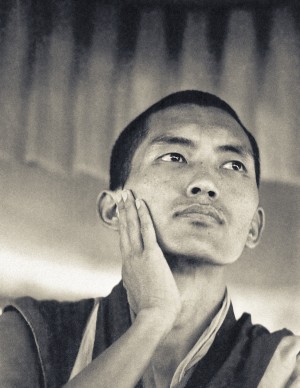
Lama Zopa Rinpoche teaching at the Sixth Kopan Course, March 1974, when he gave his most extensive teachings on the eight worldly dharmas. Photo by Ursula Bernis.
Lama Zopa Rinpoche teaches extensively on “the dissatisfied mind of desire”:
“Whether we are a Dharma practitioner or not, every problem in life comes from our own mind, as does every happiness. The cause of suffering is not external; the cause of happiness is not external. It is within us, in our mind.
“The particular thing that has created all the problems of life is the dissatisfied mind of desire, the mind clinging to this life. We try to obtain the immediate happiness of this life through what we call the eight worldly dharmas: a desire for comfort, material things (such as gifts, friends and so forth), a good reputation and praise, and an aversion to a lack of comfort and material things, a bad reputation and criticism, or blame.”
This teaching is excerpted from How to Practice Dharma: Teachings on the Eight Worldly Dharmas, edited by Gordon McDougall.
From Mandala July-September 2011.
5
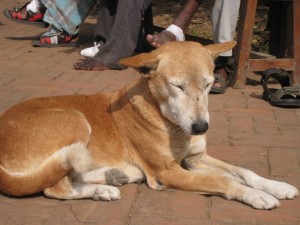
Dog warming in sun, January 2012. Photo by Phil Hunt.
Leah Richards, a veterinary nurse, has a deep love, compassion, and respect for all animals and hopes to be a veterinarian one day. While at the 2003 Kopan course, she asked Lama Zopa Rinpoche for guidance on what to do when asked to perform euthanasia on sick and suffering animals.
From Mandala October-November 2004.
- Tagged: animals, green tara, lama zopa rinpoche, mandala, taking care of others, teachings and advice
- 0
5

Ribur Rinpoche
Former FPMT executive director Massimo Corona talks to Ribur Rinpoche about monasticism in the West and how to maintain Buddhist monastic vows for the long-term.
From Mandala September-November 2001.
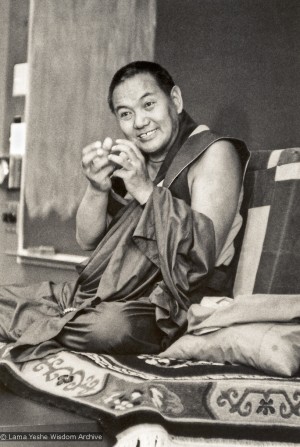
In the spring of 1978, Jan Willis arranged for Lama Yeshe to teach a course on Tibetan Buddhism at the University of Californias Oakes College on the Santa Cruz campus during the spring trimester, which ran approximately from mid-March through the end of May. Photos by Jon Landa
FPMT founder Lama Yeshe gets to the heart of karma and the ways in which we act based on “hallucinated fantasy.”
“We often talk about how we waste our lives following the eight worldly dharmas – attachment to temporal happiness, receiving material things, being praised, and having a good reputation – and aversion to their opposites – discomfort, not getting things, being criticized, and notoriety. Each time we get involved with those, we create negative karma….”
From Mandala April-May 2004.
- Tagged: karma, lama yeshe, mandala, teachings and advice
- 0
29

His Holiness the Dalai Lama. Photo by Alison Wright.
His Holiness the Dalai Lama shares his reasons for why war should be relegated to “the dustbins of history.”
From Mandala June-August 2003.

Lama Yeshe teaching, Yucca Valley, United States, 1977. Photo courtesy of Lama Yeshe Wisdom Archive.
A few words from Lama Yeshe, the founder of FPMT, on the difference between the absolute and relative guru.
From Mandala June-August 2002.
- Tagged: guru devotion, lama yeshe, mandala, teachings and advice
- 0
From Mandala September-October 1997.
FPMT offers support for support to Rinpoche’s students at the most crucial time of death by giving the names of students who die to His Holiness the Dalai Lama with the request for his prayers.
- Tagged: mandala, teachings and advice
- 0
- Home
- News/Media
- Study & Practice
- About FPMT Education Services
- Latest News
- Programs
- New to Buddhism?
- Buddhist Mind Science: Activating Your Potential
- Heart Advice for Death and Dying
- Discovering Buddhism
- Living in the Path
- Exploring Buddhism
- FPMT Basic Program
- FPMT Masters Program
- FPMT In-Depth Meditation Training
- Maitripa College
- Lotsawa Rinchen Zangpo Translator Program
- Universal Education for Compassion & Wisdom
- Online Learning Center
- Prayers & Practice Materials
- Overview of Prayers & Practices
- Full Catalogue of Prayers & Practice Materials
- Explore Popular Topics
- Benefiting Animals
- Chenrezig Resources
- Death & Dying Resources
- Lama Chopa (Guru Puja)
- Lama Zopa Rinpoche: Compendium of Precious Instructions
- Lama Zopa Rinpoche: Life Practice Advice
- Lama Zopa Rinpoche Practice Series
- Lamrim Resources
- Mantras
- Prayer Book Updates
- Purification Practices
- Sutras
- Thought Transformation (Lojong)
- Audio Materials
- Dharma Dates – Tibetan Calendar
- Translation Services
- Publishing Services
- Teachings and Advice
- Find Teachings and Advice
- Lama Zopa Rinpoche Advice Page
- Lama Zopa Rinpoche: Compendium of Precious Instructions
- Lama Zopa Rinpoche Video Teachings
- ༧སྐྱབས་རྗེ་བཟོད་པ་རིན་པོ་ཆེ་མཆོག་ནས་སྩལ་བའི་བཀའ་སློབ་བརྙན་འཕྲིན།
- Podcasts
- Lama Yeshe Wisdom Archive
- Buddhism FAQ
- Dharma for Young People
- Resources on Holy Objects
- Ways to Offer Support
- Centers
- Affiliates Area
- Teachers
- Projects
- Charitable Projects
- Make a Donation
- Applying for Grants
- News about Projects
- Other Projects within FPMT
- Support International Office
- Projects Photo Galleries
- Give Where Most Needed
- FPMT
- Shop
Subscribe to FPMT News
Translate*
*powered by Google TranslateTranslation of pages on fpmt.org is performed by Google Translate, a third party service which FPMT has no control over. The service provides automated computer translations that are only an approximation of the websites' original content. The translations should not be considered exact and only used as a rough guide.Don’t think of Buddhism as some kind of narrow, closed-minded belief system. It isn’t. Buddhist doctrine is not a historical fabrication derived through imagination and mental speculation, but an accurate psychological explanation of the actual nature of the mind.







